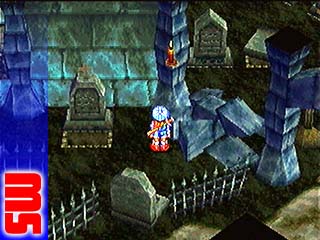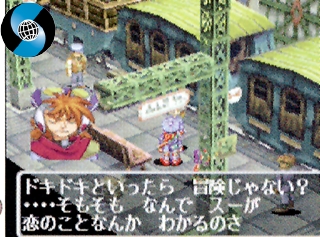|
|

|
BATTLE SYSTEM
|

|
INTERACTION
|

|
ORIGINALITY
|

|
STORY
|

|
MUSIC & SOUND
|

|
VISUALS
|

|
CHALLENGE
|
Unthreatening
|
COMPLETION TIME
|
60-75 hours
|
|
OVERALL
5.0/5
|
Rating definitions
|
|
|
1997 was a pivotal year for the RPG market. Even though I’ve never played a certain title that featured VERY prominently at the time, its influence was vast and seemingly never-ending. Yet at the time there were RPGamers, fed up with Sega of America’s continuing bungling of the Saturn beyond belief, who decided to investigate a new RPG for the Saturn that would not be translated by Sega at any time. Comparisons were made at the time of this title, Grandia, to the certain monolithic game that dominates RPG discussions even today. Very favorable comparisons indeed were made by those who played both games, such that some declared Grandia better than the monolithic title. I have not played the monolithic title, and thus cannot make a comparison. On its own merits, however, Grandia is a truly sensational game. Had it been translated for the English-speaking market by Sega instead of being ported to the PS two years later in an attempt to garner more sales, perhaps the Saturn would be remembered more fondly among the wider RPGamer audience than it actually is.
As I did indeed play the original Saturn version of Grandia, its story is not something I can claim to comprehensively understand. Unfinished translations exist, however, and through them and my paltry understanding of Japanese a reasonable overview of what happens in Grandia arose within my malleable mind. The story begins in the city of Palm, where Justin is playing a game with neighborhood hoodlums over their right to marry his friend Sue, her being all of 8 years old. Upon resolution of this crisis, Justin and Sue get it into their heads to explore the Salt ruins after a conversation with the local museum director. Justin wants to do this because his great ambition is to be an adventurer, Sue wants to because she idolizes Justin. At the Salt ruins Justin and Sue run into members of the Garlysle army, which is also seeking material from the ancient civilization that once ruled the world….
 OKAY, who put the graveyard inside the house?
OKAY, who put the graveyard inside the house?
|
|
The story from that point finds Justin and Sue heading to New Palm via ship, in an effort to discover the location of a place called Alent, after they learned a bit about it deep within the Salt ruins. Along the way they meet Feena, respected adventurer extraordinaire who catches Justin’s eye. From there the story goes on a very long progression that uses quite a few clichés – but in a good way. The plot may not be particularly insightful but it is good in the fashion it seeks to be, that of a rollicking adventure.
Battling takes up a good chunk of time in any RPG. For many, the battle system is perfunctory; adequate without drawing attention to itself or warranting much excitement from the player. Grandia’s battles are not perfunctory. Rarely have I experienced as much fun from fighting as in this game.
While not by any means the most important part of this, the non-random nature of battles is important. Enemies have varied means of moving about the landscape, and it is almost always possible to take them by surprise should the player desire it. Enemies can do the same to the player however, and in this sense having more people in a party is a detriment because all of them run in a line, and the longer the line the easier for an enemy to take the back of it.
 Based upon his expression, Justin is waiting for an Italian train!
Based upon his expression, Justin is waiting for an Italian train!
|
|
Grandia’s battles proceed in a semi-real time fashion the way they do in further iterations of the series. Characters and enemies have their readiness monitored on a bar in the bottom right. From the left of the bar up to the point of entering a command, the player has no control over the characters; but they won’t be doing anything save running about the field anyway. When it comes to the time of entering a command, characters can choose to use a combo attack (usually two strikes) or a critical. Both of these will move to the point of action immediately, with the caveat that if the player chooses to physically assault something located a distance from the character time must be expended in moving across the field to launch the attack. A combo attack does more damage, a critical has the ability to stop an enemy’s attack (if it is in the phase between entering the command and actually performing it) and making the enemy choose its action again. Defending brings with it the option to defend where the character currently is, or to have the character move elsewhere on the field while defending. Magic and special attacks have the need to wait for a little while before they are performed, and enemies also possess the ability to cancel player actions and make a character waste time before deciding an action again.
Experience awarded after battle performs the same function as in most RPGs, at least in the sense of characters getting statistical benefits from reaching a set amount of that experience. Those statistical benefits aren’t very high, however. This is because experience is not gained simply from killing enemies, but from using weapons and magic. Every character has the ability to use at least one type of weapon, and every time it is used directly against a foe the weapon experience goes up. When the weapon experience reaches 100, it gains a level and starts growing again from 0. At weapon level-up, the character will gain a HP or two and possibly the ability to use a new skill (skills are totally dependent upon reaching certain levels with weapons) along with other statistic benefits that are harder to gauge without a grasp of Japanese. Skills also improve with constant use, moving from half a star to 5 stars in efficiency; at half a star it takes a painfully long time to use a skill, at 5 stars usage is essentially instantaneous.
Magic is gained in the first place via locating Mana eggs, which are scattered around the environments. There are four basic magic varieties; fire, wind, water, and earth. One Mana egg grants one character the ability to learn one type of spell. Using the spells of any given element repeatedly garners experience in that element, and elements combine to form new spells (fire + earth, fire + wind, earth + water, water + wind). Each character starts with the same basic spells but learns different ones as the experience in elements grows. Also, leveling up magic improves statistics, as does leveling up weapons and gaining levels in the traditional way. Spell aptitude is also increased by constant use of spells, similar to skill aptitude. Spells additionally come in three varieties, with a different MP total for each level of spell. Spells gain more experience when they are used against more targets, so keeping enemies alive as long as possible in battle to use more spells against them becomes a common practice.
Interaction is pretty simple. Save during story segments, the player has control of the camera at all times by using the L and R buttons to tilt it. The camera is constantly high overhead, and while tilting it around so much is occasionally annoying the freedom is nice. Equipping items is easy and using them outside and inside of battle is also easy, although deciphering the effects of many is a challenge to non-Japanese speakers. Two issues exist with interaction however. One is that shops have a separate place to buy weapons, armor, accessories, items, and to sell things. This makes shop usage take awhile. Also, each character has a limit of 12 unequipped items to keep. This can be very annoying when the ability to store spare items is unavailable.
Graphically Grandia is stellar. The Saturn was never known as a 3D powerhouse compared to the PlayStation, but Grandia looks damn good for all the 3D present. There are a few stutters while shifting the camera around, but they have no practical impact. Aurally Grandia features an interesting mix of great music and much shorter sound bites. Many areas feature 10-20 second clips that sound interesting for awhile but get repetitive quickly, even with instruments not commonly heard in RPG soundtracks being prominent; none of these short bits are found on the OST. Voice acting is present but will probably be heard, in sum, more during battle than during story portions of the game. It also falls prey during story portions to the horrible ailment of not reducing music volume to enable speech to be heard. Well-known seiyuu are present to voice most of the characters in Grandia, and what can be heard sounds convincing.
Grandia is a fairly linear game, but each area allows for quite a bit of wandering about. Between areas the game is very obviously linear; it features a ‘world map’ that consists of locations the player can choose to visit, with some of them unavailable as time goes on. On the second disc there are a few entirely optional areas, however, with the rewards and extra playtime to be expected from such. These optional areas are fairly challenging, but the game as a whole is not terribly difficult provided one is able to deal with the battle system’s workings. Insofar as length, Grandia is one of the longest RPGs I have ever come across. Though I wandered back-and-forth repeatedly while stretching out combat to a ridiculous extent, my save file of 96 hours is definitely not as long as would be required for someone to maximize levels in magic and weapons. 60 hours is probably about the minimum required for completion.
Aside from cost, there probably is no reason to attain the Saturn version of Grandia over the translated PS version. Unless of course one detests terrible voice acting, which Sony’s version provided in enormous quantities. Had the Saturn gotten an English version of this game, perhaps Panzer Dragoon Saga would not be the only highly desired more-or-less traditional title released outside Japan that attracts great notice. Late 1997 was too late to save the Saturn from demise, but another quality game wouldn’t have hurt. Let alone such an outstanding title as this.
Review Archives
|









